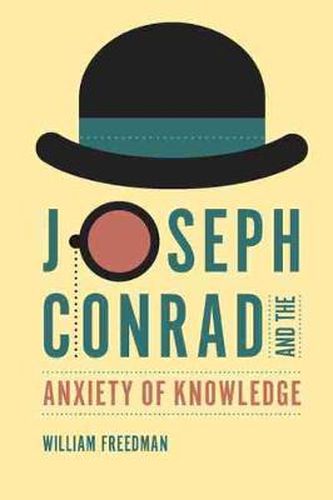Readings Newsletter
Become a Readings Member to make your shopping experience even easier.
Sign in or sign up for free!
You’re not far away from qualifying for FREE standard shipping within Australia
You’ve qualified for FREE standard shipping within Australia
The cart is loading…






Few if any writers in the English language have been cited, praised, chided, or marvelled at more routinely than Joseph Conrad for the perplexing evasiveness, contradictoriness, and indeterminacy of their fiction. William Freedman argues that the explanations typically offered for these identifying characteristics of much of Conrad’s work are inadequate if not mistaken.
Freedman’s claim is that the illusiveness of a coherent interpretation of Conrad’s novels and shorter fictions is owed not primarily to the inherent slipperiness or inadequacy of language or the consequence of a wilful self-deconstruction. Nor is it a product of the writer’s philosophical nihilism or a realized aesthetic of suggestive vagueness. Rather, Freedman argues, the perplexing elusiveness of Conrad’s fiction is the consequence of a pervasive ambivalence toward threatening knowledge, a protective reluctance and recoil that are not only inscribed in Conrad’s tales and novels, but repeatedly declared, defended, and explained in his letters and essays.
Conrad’s narrators and protagonists often set out on an apparent quest for hidden knowledge or are drawn into one. But repelled or intimidated by the looming consequences of their own curiosity and fervour, they protectively obscure what they have barely glimpsed or else retreat to an armoury of practiced distractions. The result is a confusingly choreographed dance of approach and withdrawal, fascination and revulsion, revelation and concealment. The riddling contradictions of these fictions are thus in large measure the result of this ambivalence, their evasiveness the mark of intimidation’s triumph over fascination.
The idea of dangerous and forbidden knowledge is at least as old as Genesis, and Freedman provides a background for Conrad’s recoil from full exposure in the rich admonitory history of such knowledge in theology, myth, philosophy, and literature. He traces Conrad’s impassioned, at times pleading case for protective avoidance in the writer’s letters, essays, and prefaces, and he elucidates its enactment and its connection to Conrad’s signature evasiveness in a number of short stories and novels, with special attention to The Secret Agent, Heart of Darkness, Lord Jim, Under Western Eyes, and The Rescue.
$9.00 standard shipping within Australia
FREE standard shipping within Australia for orders over $100.00
Express & International shipping calculated at checkout
Few if any writers in the English language have been cited, praised, chided, or marvelled at more routinely than Joseph Conrad for the perplexing evasiveness, contradictoriness, and indeterminacy of their fiction. William Freedman argues that the explanations typically offered for these identifying characteristics of much of Conrad’s work are inadequate if not mistaken.
Freedman’s claim is that the illusiveness of a coherent interpretation of Conrad’s novels and shorter fictions is owed not primarily to the inherent slipperiness or inadequacy of language or the consequence of a wilful self-deconstruction. Nor is it a product of the writer’s philosophical nihilism or a realized aesthetic of suggestive vagueness. Rather, Freedman argues, the perplexing elusiveness of Conrad’s fiction is the consequence of a pervasive ambivalence toward threatening knowledge, a protective reluctance and recoil that are not only inscribed in Conrad’s tales and novels, but repeatedly declared, defended, and explained in his letters and essays.
Conrad’s narrators and protagonists often set out on an apparent quest for hidden knowledge or are drawn into one. But repelled or intimidated by the looming consequences of their own curiosity and fervour, they protectively obscure what they have barely glimpsed or else retreat to an armoury of practiced distractions. The result is a confusingly choreographed dance of approach and withdrawal, fascination and revulsion, revelation and concealment. The riddling contradictions of these fictions are thus in large measure the result of this ambivalence, their evasiveness the mark of intimidation’s triumph over fascination.
The idea of dangerous and forbidden knowledge is at least as old as Genesis, and Freedman provides a background for Conrad’s recoil from full exposure in the rich admonitory history of such knowledge in theology, myth, philosophy, and literature. He traces Conrad’s impassioned, at times pleading case for protective avoidance in the writer’s letters, essays, and prefaces, and he elucidates its enactment and its connection to Conrad’s signature evasiveness in a number of short stories and novels, with special attention to The Secret Agent, Heart of Darkness, Lord Jim, Under Western Eyes, and The Rescue.